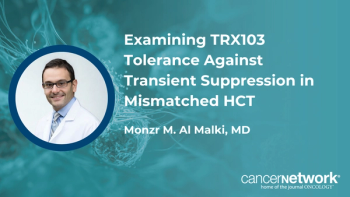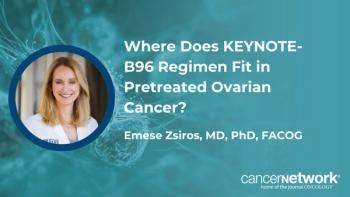
Sintilimab Plus Chemotherapy Meets Primary End Point of Significantly Improved OS for Advanced/Metastatic Gastric or GEJ Carcinoma
The phase ORIENT-16 trial indicated that the addition of sintilimab to chemotherapy significantly improved of overall survival compared with placebo.
First-line sintilimab (Tyvyt) in combination with chemotherapy significantly improved survival in a population of patients with advanced or metastatic gastric or gastroesophageal junction adenocarcinoma, according to the results of the phase 3 ORIENT-16 study (NCT03745170).1
Findings from the interim analysis indicated that sintilimab and chemotherapy yielded a statistically significant improvement in overall survival (OS) compared with placebo plus chemotherapy, meeting the study’s primary end point. Additionally, the benefit was observed in both the intent-to-treat population and the PD-L1–positive group. There were no additional safety signals observed with this combination. The full study results will be presented at an upcoming meeting, investigators stated.
"While immunotherapy has greatly changed the treatment paradigm for many malignancies, it has not yet in gastric cancer. The treatment options for advanced gastric cancer are very limited and the ORIENT-16 study aimed to help address this unmet medical need. These results are very encouraging and confirmed the clinical value of sintilimab plus chemotherapy in the first-line treatment of advanced gastric cancer,” Zhou Hui, MD, senior vice president of clinical development of Innovent, said in a press release.
The phase 3 double blind randomized trial was estimated to enroll about 650 patients in order to examine the safety and efficacy of sintilimab plus chemotherapy.2 Patients who enrolled were randomized 1:1 to receive either sintilimab plus oxaliplatin and capecitabine or the placebo plus oxaliplatin and capecitabine.
Patients received sintilimab at a dose of 200 mg on day 1 every 3 weeks by intravenous infusion with intravenous oxaliplatin given 130 mg/m2 every 3 weeks, and oral capecitabine at 1000 mg/m2 orally twice daily for 14 days on and 7 days off. Those in the placebo group received the same chemotherapy backbone plus the placebo, which was administer intravenously at 200 mg every 3 weeks.
The key secondary end points were progression-free survival, duration of response, and objective response rate.
Innovent plans on submitting a supplemental new drug application fpr sintilimab with the Drug Evaluation Center of the National Medical Products Administration in China. Currently, the FDA has accepted sintilimab’s Biologics License Application for review in combination with pemetrexed and platinum therapy for the first-line treatment of nonsquamous non–small cell lung cancer.
Reference:
1. Innovent announces sintilimab in combination with chemotherapy meets the primary end point of overall survival in the phase 3 ORIENT-16 study for the first-line treatment of advanced or metastatic gastric or gastroesophageal junction adenocarcinoma. News Release. Innovent. August 15, 2021. Accessed August 19, 2021.
2. Xu J, Jin Y, Zhou H, et al. Abstract CT213: ORIENT-16: Sintilimab plus XELOX vs placebo plus XELOX as 1st line treatment for unresectable advanced gastric and GEJ adenocarcinoma. Presented at AACR Annual Meeting; March 29-April 3, 2019; Atlanta, GA. Accessed August 19, 2021. https://bit.ly/3kaeBIe
3. Ren Z, Xu J, Bai Y, et al. Sintilimab plus a bevacizumab biosimilar (IBI305) versus sorafenib in unresectable hepatocellular carcinoma (ORIENT-32): a randomised, open-label, phase 2-3 study. Lancet Oncol. 2021;22(7):977-990. doi:10.1016/S1470-2045(21)00252-7
Newsletter
Stay up to date on recent advances in the multidisciplinary approach to cancer.










































